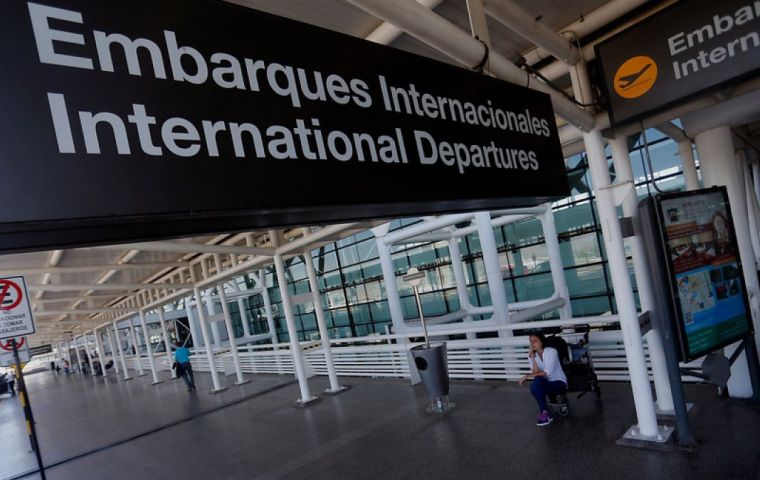MercoPress. South Atlantic News Agency
Feminists oppose renaming Chile's main airport after Pablo Neruda
 Santiago's airport in the Pudahuel area seems to need renaming. Aviation pioneer Arturo Merino Benítez not good enough?
Santiago's airport in the Pudahuel area seems to need renaming. Aviation pioneer Arturo Merino Benítez not good enough? As the project to rename Santiago's international airport is back under the spotlight, feminist groups have brought the attention to the fact that 1971 Literature Nobel Prize winner Pablo Neruda is not worthy of that honour.
The original 2011 proposal argued that “the great Chilean poet is considered among the best and most influential of his century, having being called by the novelist Gabriel García Márquez 'the greatest poet of the twentieth century in any language'.”
But feminist organizations rejected it, assuring that, at the height of the Me Too movement, it would portray a bad image of the country abroad, based on two dark aspects of Neruda's life: the abandonment of his daughter, Malva Marina, and the rape of a maid in Ceylon (now Sri Lanka), where Neruda was serving as a diplomat in 1929.
The air terminal is currently named after Arturo Merino Benítez, founder and first commander in chief of the Chilean Air Force (FACh), founder of the National Airline (LAN) which after merging with Brazil's TAM resulted in the largest passenger carrier in South America LATAM, and also father of the current FACh chief Arturo Merino Núñez.
“His poetry is not enough,” the opposing groups have said. Although one of Chile's most recognizable faces everywhere, Neruda's aura has waned down since the story of his daughter became known.
The fictional story “Malva” by Dutch poet Hagan Peeters describes that the girl was born in 1934, with hydrocephalus, and died only eight years later abandoned by her father.
When the case was spread in 2016, the Pablo Neruda Foundation, which preserves the author's legacy, issued a note in which they assure that the separation was by mutual agreement and that “Neruda went to see his daughter the last time he could, in 1939, on the last trip he could make to Europe, and cited poems such as ”Diseases in my house“ to refute the accusation of an abandoning father.
The Spanish Civil War where the Communist Neruda sided with the losing Republicans, the rise of Nazism and the Second World War made travel to and from Europe difficult.
As for the rape in Sri Lanka, in his memoirs, I confess that I have lived, Neruda, whose real name was Ricardo Eliécer Neftalí Reyes Basoalto, wrote:
”One morning, determined to everything, I took it tightly from the doll and looked at her face. There was no language I could talk to her about. She let herself be led by me without a smile and soon she was naked on my bed. (...) The encounter was that of a man with a statue. She remained all the time with her eyes open, impassive. She did well to despise me. The experience was not repeated.“
The Socialist Marcelo Diaz, president of the Commission behind the name change project, admitted ”this kind of questioning makes sense, [but it] that does not mean that Pablo Neruda is not one of the most relevant poets not only of Chile, but of the world.”
In addition to his artistic legacy, the promoters of the project highlight the political importance of Pablo Neruda, who was a militant Communist, a senator, a diplomat and someone who eventually resigned a presidential candidacy in favor of Salvador Allende.
The groups against naming the airport after Neruda have suggested the name of the far less controversial Gabriela Mistral, also a Chilean poet and a Nobel Prize winner.




Top Comments
Disclaimer & comment rulesCommenting for this story is now closed.
If you have a Facebook account, become a fan and comment on our Facebook Page!